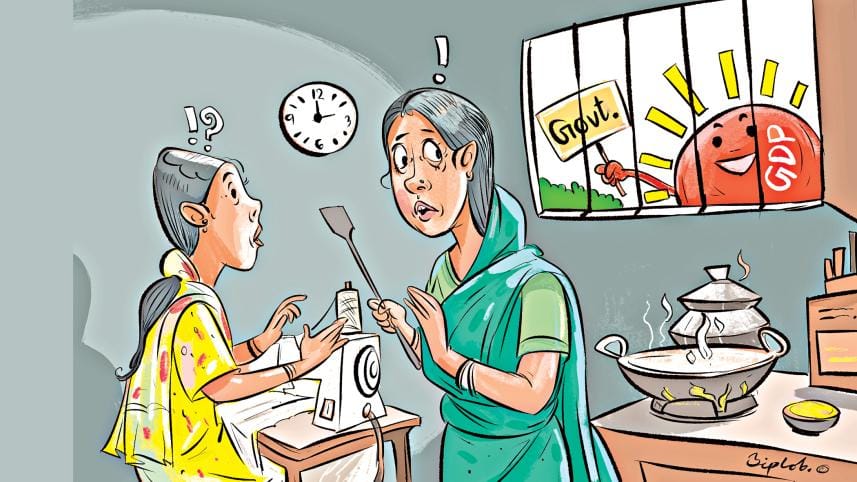Women’s unpaid work to finally get recognised

In a historic move, Bangladesh's national budget has, for the first time, pledged institutional recognition for women's unpaid and unacknowledged caregiving and household work.
The government plans to include the economic value of this unpaid labour in the country's GDP calculations -- a major policy shift.
While announcing the national budget for 2025–26, Finance Adviser Salehuddin Ahmed acknowledged the vital role of homemakers, saying, "Alongside working women, many women dedicate their time and labour as homemakers. However, their significant role is often not properly acknowledged. On behalf of the government and the people, I extend my deepest respect and gratitude to them."
He further pledged that "in the future, necessary procedural steps will be taken to include these women's contributions in the GDP based on financial standards".
Globally, unpaid care work represents a vast yet invisible contribution to economies. According to a 2018 International Labour Organization estimation, 16.4 billion hours of unpaid care work are performed daily worldwide -- the equivalent of 2 billion full-time jobs and nearly nine percent of the global GDP.
A recent 2024 study by the Bangladesh Institute of Development Studies (BIDS) estimated that women's unpaid household and caregiving labour in Bangladesh amounted to Tk 5.3 trillion in 2021, or approximately 14.8 percent of the nation's GDP. In contrast, men's unpaid work accounted for just 2.8 percent.
The study revealed stark gender disparities in the division of unpaid labour. Women spent 4.6 hours a day on household work, compared to men's 0.6 hours, and 1.2 hours on caregiving versus men's 0.2 hours. In total, 24.5 percent of women's daily time is consumed by unpaid labour -- a striking difference from men's 3.3 percent. Meanwhile, men spend an average of 6.1 hours a day on paid or self-employment activities, while women manage just 1.2 hours.
These figures were calculated using the daily wages of unskilled workers -- Tk 37.5 per hour for rural and Tk 43.5 for urban women -- but fail to capture the skilled and emotional dimensions of care work. When these factors are taken into account, the estimated value of women's unpaid labour rises to 18.5–19.6 percent of GDP, the BIDS study noted.
Manusher Jonno Foundation (MJF), which has been advocating for institutional recognition of women's unpaid care work for the past 15 years, termed this a "historic step".
The organisation extended its appreciation to the finance adviser for his commitment to formally recognising women's unpaid work in the national budget.
MJF Executive Director Shaheen Anam said, "Recognising women's household and care work in the national budget is crucial for achieving inclusive economic growth and gender equality in Bangladesh. Traditional economic indicators have long rendered women's significant contributions through unpaid domestic labour virtually invisible. We thank the honourable finance adviser for committing to institutional recognition of women's unacknowledged work.
"MJF looks forward to seeing the implementation of this initiative. We believe it is possible to include women's unpaid work in the GDP through a satellite account."
Highlighting MJF's long-standing campaign, Shaheen Anam said, "For the past 15 years, Manusher Jonno Foundation has been advocating for this recognition. Through the satellite account, this recognition will enhance the dignity of women, challenge negative attitudes, ensure their participation in decision-making, and ultimately help reduce violence against them both at home and in society."
A Centre for Policy Dialogue survey, commissioned by MJF, stated that the value of unpaid care work is 2.5 to 2.9 times higher than women's income from paid labour. MJF believes that recognising this work is a step towards equal rights and women's advancement, and will support Bangladesh's commitment to achieving Sustainable Development Goal-5 (Gender Equality).
The implementation of this budgetary commitment, MJF noted, would take Bangladesh a step closer to building an inclusive, just, and equitable society.
Bangladesh Mahila Parishad President Fauzia Moslem also welcomed the government's announcement. "It is very encouraging that this crucial issue has gained acceptance at both government and administrative levels. We express our appreciation for this."
She, however, said, "We would like to stress that this should not remain just a declaration. To truly benefit women, the government must establish proper methods and procedures to calculate and implement this recognition in practice."





 For all latest news, follow The Daily Star's Google News channel.
For all latest news, follow The Daily Star's Google News channel.
Comments